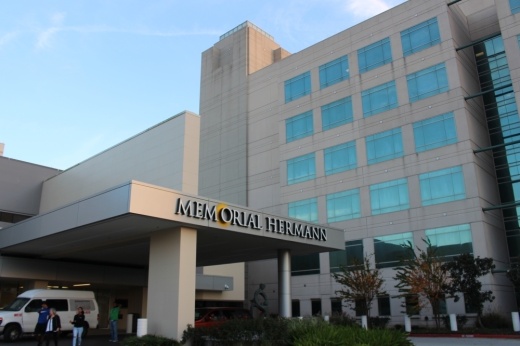“When you start talking about capacity challenges, what it really means is that there are other services that hospitals usually attend to that can’t necessarily be attended to in the same form or fashion as what we would normally,” Kendrick said.
Memorial Hermann The Woodlands is operating at about 90% licensed bed capacity, with 25% of those being filled with COVID-19 patients, Kendricks said. Memorial Hermann Northeast has 50% of beds occupied with COVID-19 patients and is currently operating with 120% bed capacity, according to Kendricks.
Kendricks said a hospital begins to have difficulty treating patients when it starts operating around 80% bed capacity and up.
Kendricks said 95%-99% of COVID-19 hospitalizations in the Houston area are of unvaccinated individuals. Daniel Kievlan, co-medical director of critical care at Memorial Hermann The Woodlands, also said the average age of patients are younger than in previous surges, with many individuals in their 30s, 40s and 50s.
“Even though the delta variant is raging through Houston right now, we are still seeing the vast majority of patients coming into our ICUs being unvaccinated,” Kievlan said.
Kievlan stressed the safety and effectiveness of the vaccines currently available to protect against COVID-19. He said since January, when the vaccines were first being administered, he has had four vaccinated patients in the ICU, two of which had underlying conditions.
Going back to school
With classes having already started or beginning in the coming weeks in many Houston-area school districts, Amrita Singh, a pediatric doctor at Texas Children’s Hospital, recommended universal masking for staff and children. Singh said those who are able to get the vaccine—children 12 and older—should get it to protect themselves and others.
“We are surging now; we haven’t flattened the curve; and schools are opening, so it's really a pressing matter that we do what we can to flatten the curve right now,” Singh said.
Singh said there has been a large uptick in the number of young children she has seen in the hospital, something she said was uncharacteristic of the last COVID-19 surges. She said she has seen more patients recently than she has in the entire 18 previous months of the pandemic.
“We are seeing kids come into the hospital that we were not seeing before,” Singh said.
Singh also stressed the importance of returning to school in person. She said virtual learning had a negative impact on the mental health of many children, leading to a large increase in suicide attempts. However, she said in-person learning needs to be conducted safely.
Vaccine hesitancy
Pavan Thangudu, a critical care doctor at Memorial Hermann, said there are many personal reasons why individuals may be hesitant to get the vaccine. However, he said it is important for people to get the vaccine to protect their own health and to help the community continue to fight the pandemic.
“The risks of the vaccine are minimal compared to the risks of this virus,” Thangudu said.
Kievlan acknowledged that there are breakthrough cases of those who have been vaccinated and tested positive for COVID-19, but he said being vaccinated prevents the risk of developing life-threatening symptoms from the virus.
On the other hand, many who are unvaccinated develop serious symptoms, he said. For example, those who need to be put on ventilators have a 50% mortality rate, Kievlan said.
Thangudu said having a previous exposure to the virus should not be a reason to not get the vaccine, even though an individual may already have some antibodies. He cited a Centers for Disease Control and Prevention study that showed patients who had been exposed to COVID-19 but are not vaccinated were twice as likely to develop an infection and severe symptoms than those who had the virus and received immunization.
Thangudu said for those wondering when they should get vaccinated if they have been infected with the virus, it is best to wait at least 90 days after the onset of symptoms to get immunized.
Marco Giannatti, a gynecologist at Memorial Hermann The Woodlands, said the vaccine also poses no threat to pregnant women or women who have recently given birth.
“There really is zero reason not to get this vaccine at any stage during a woman’s reproductive life,” Giannatti said.
Giannatti stressed the importance of trusting doctors and health care professionals as they urge individuals to get the vaccine.
“If it’s that important for me and my family, it should be just as important for you and yours,” Giannatti said.





